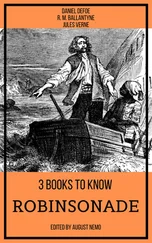Of all the things, however, that afforded matter of amusement to these savages, that which pleased Romata’s visitor most was the ship’s pump. He never tired of examining it and pumping up the water. Indeed, so much was he taken up with this pump that he could not be prevailed on to return on shore, but sent a canoe to fetch his favourite stool, on which he seated himself, and spent the remainder of the day in pumping the bilge-water out of the ship!
Next day the crew went ashore to cut sandal-wood, while the captain, with one or two men, remained on board, in order to be ready, if need be, with the brass gun, which was unhoused and conspicuously elevated, with its capacious muzzle directed point-blank at the chief’s house. The men were fully armed, as usual; and the captain ordered me to go with them, to assist in the work. I was much pleased with this order, for it freed me from the captain’s company, which I could not now endure, and it gave me an opportunity of seeing the natives.
As we wound along in single file through the rich, fragrant groves of banana, cocoa-nut, bread-fruit, and other trees, I observed that there were many of the plum and banyan trees, with which I had become familiar on the Coral Island. I noticed, also, large quantities of taro — roots, yams, and sweet potatoes growing in enclosures. On turning into an open glade of the woods, we came abruptly upon a cluster of native houses. They were built chiefly of bamboos, and were thatched with the large, thick leaves of the pandanus; but many of them had little more than a sloping roof and three sides with an open front, being the most simple shelter from the weather that could well be imagined. Within these and around them were groups of natives — men, women, and children — who all stood up to gaze at us as we marched along, followed by the party of men whom the chief had sent to escort us. About half-a-mile inland we arrived at the spot where the sandal-wood grew, and while the men set to work I clambered up an adjoining hill to observe the country.
About midday the chief arrived with several followers, one of whom carried a baked pig on a wooden platter, with yams and potatoes on several plantain leaves, which he presented to the men, who sat down under the shade of a tree to dine. The chief sat down to dine also; but, to my surprise, instead of feeding himself, one of his wives performed that office for him! I was seated beside Bill, and asked him the reason of this.
“It is beneath his dignity, I believe, to feed himself,” answered Bill; “but I dare say he’s not particular, except on great occasions. They’ve a strange custom among them, Ralph, which is called tabu, and they carry it to great lengths. If a man chooses a particular tree for his god, the fruit o’ that tree is tabued to him; and if he eats it, he is sure to be killed by his people — and eaten, of course, for killing means eating hereaway. Then, you see that great mop o’ hair on the chief’s head? Well, he has a lot o’ barbers to keep it in order; and it’s a law that whoever touches the head of a living chief or the body of a dead one, his hands are tabued. So in that way the barbers’ hands are always tabued, and they daren’t use them for their lives, but have to be fed like big babies — as they are, sure enough!”
“That’s odd, Bill. But look there,” said I, pointing to a man whose skin was of a much lighter colour than the generality of the natives. “I’ve seen a few of these light-skinned fellows among the Feejeeans. They seem to me to be of quite a different race.”
“So they are,” answered Bill. “These fellows come from the Tongan Islands, which lie a long way to the eastward. They come here to build their big war-canoes; and as these take two, and sometimes four, years to build, there’s always some o’ the brown-skins among the black sarpents o’ these islands.”
“By the way, Bill,” said I, “your mentioning serpents reminds me that I have not seen a reptile of any kind since I came to this part of the world.”
“No more there are any,” said Bill, “if ye except the niggers themselves. There’s none on the islands but a lizard or two, and some sich harmless things; but I never seed any myself. If there’s none on the land, however, there’s more than enough in the water; and that reminds me of a wonderful brute they have here. But come, I’ll show it to you.” So saying, Bill arose, and leaving the men still busy with the baked pig, led me into the forest. After proceeding a short distance we came upon a small pond of stagnant water. A native lad had followed us, to whom we called and beckoned him to come to us. On Bill saying a few words to him, which I did not understand, the boy advanced to the edge of the pond and gave a low, peculiar whistle. Immediately the water became agitated, and an enormous eel thrust its head above the surface and allowed the youth to touch it. It was about twelve feet long, and as thick round the body as a man’s thigh.
“There!” said Bill, his lip curling with contempt; “what do you think of that for a god, Ralph? This is one o’ their gods, and it has been fed with dozens o’ livin’ babies already. How many more it’ll get afore it dies is hard to say.”
“Babies!” said I with an incredulous look.
“Ay, babies,” returned Bill. “Your soft-hearted folk at home would say, ‘Oh, horrible! Impossible!’ to that, and then go away as comfortable and unconcerned as if their sayin’ ‘Horrible! impossible!’ had made it a lie. But I tell you, Ralph, it’s a fact. I’ve seed it with my own eyes the last time I was here; an’ mayhap, if you stop awhile at this accursed place and keep a sharp lookout, you’ll see it too. They don’t feed it regularly with livin’ babies, but they give it one now and then as a treat. — Bah, you brute!” cried Bill in disgust, giving the reptile a kick on the snout with his heavy boot that sent it sweltering back in agony into its loathsome pool. I thought it lucky for Bill — indeed for all of us — that the native youth’s back happened to be turned at the time, for I am certain that if the poor savages had come to know that we had so rudely handled their god we should have had to fight our way back to the ship. As we retraced our steps I questioned my companion further on this subject.
“How comes it, Bill, that the mothers allow such a dreadful thing to be done?”
“Allow it? the mothers do it! It seems to me that there’s nothing too fiendish or diabolical for these people to do. Why, in some of the islands they have an institution called the Areoi, and the persons connected with that body are ready for any wickedness that mortal man can devise. In fact, they stick at nothing; and one o’ their customs is to murder their infants the moment they are born. The mothers agree to it, and the fathers do it. And the mildest ways they have of murdering them is by sticking them through the body with sharp splinters of bamboo, strangling them with their thumbs, or burying them alive and stamping them to death while under the sod.”
I felt sick at heart while my companion recited these horrors.
“But it’s a curious fact,” he continued after a pause, during which we walked in silence towards the spot where we had left our comrades —“it’s a curious fact that wherever the missionaries get a footin’ all these things come to an end at once, an’ the savages take to doin’ each other good and singin’ psalms, just like Methodists.”
“God bless the missionaries,” said I, while a feeling of enthusiasm filled my heart so that I could speak with difficulty. “God bless and prosper the missionaries till they get a footing in every island of the sea!”
“I would say Amen to that prayer, Ralph, if I could,” said Bill, in a deep, sad voice; “but it would be a mere mockery for a man to ask a blessing for others who dare not ask one for himself. But, Ralph,” he continued, “I’ve not told you half o’ the abominations I have seen durin’ my life in these seas. If we pull long together, lad, I’ll tell you more; and if times have not changed very much since I was here last, it’s like that you’ll have a chance o’ seeing a little for yourself before long.”
Читать дальше












